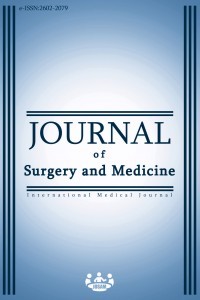Şüpheli ilaç ve gıda alerjisi olan çocukların ebeveynlerinde provokasyon testleri ile ilişkili anksiyete ve depresyon düzeyleri
Besin provokasyon testi, İlaç provokasyon testi, Ebeveyn, Anksiyete, Depresyon
Parental anxiety and depression levels associated with challenge tests in children with suspected drug and food allergies
Oral food challenge, drug provocation test, parental, anxiety, depression,
___
- 1. Sicherer SH, Sampson HA. Food Allergy: A Review and Update on Epidemiology, Pathogenesis, Diagnosis, Prevention, and Management. J Allergy Clin Immunol. 2018;141:41-58
- 2. Vickery BP, Burks W. Oral immunotherapy for food allergy. Curr Opin Pediatr. 2010;22:765-770.
- 3. Feng C, Kim JH. Beyond Avoidance: The Psychosocial Impact of Food Allergies. Clin Rev Allergy Immunol. 2019;57(1):74-82.
- 4. Venter C, Sommer I, Moonesinghe H, Grundy J, Glasbey G, Patil V, et al. Health-related quality of life in children with perceived and diagnosed food hypersensitivity. Pediatr Allergy Immunol. 2015;26(2):126-32.
- 5. Cummings AJ, Knibb RC, Erlewyn-Lajeunesse M, King RM, Roberts G, Lucas JS. Management of nut allergy influences quality of life and anxiety in children and their mothers. Pediatr Allergy Immunol. 2010;21:586-94.
- 6. Primeau MN, Kagan R, Joseph L, Lim H, Dufresne C, Duffy C, et al. The psychological burden of peanut allergy as perceived by adults with peanut allergy and the parents of peanut-allergic children. Clin Exp Allergy. 2000;30(8):1135-43.
- 7. Avery NJ, King RM, Knight S, Hourihane JO. Assessment of quality of life in children with peanut allergy. Pediatr Allergy Immunol. 2003;14(5):378-82.
- 8. Flokstra-de Blok BM, Dubois AE, Vlieg-Boerstra BJ, Oude Elberink JN. Health-related quality of life of food allergic patients: comparison with the general population and other diseases. Allergy. 2010;65(2):238-44.
- 9. Demoly P, Pichler W, Pirmohamed M, Romano A. Important questions in allergy:Drug allergy/hypersensitivity. Allergy. 2008; 63:616-9.
- 10. Aberer W, Kränke B. Provocation tests in drug hypersensitivity. Immunol Allergy Clin North Am. 2009;29:567-84.
- 11. Soyyiğit Ş, Aydın Ö, Yılmaz İ, Özdemir SK, Cankorur VŞ, Atbaşoğlu C, et al. Evaluation of drug provocation test-related anxiety in patients with drug hypersensitivity. Ann Allergy Asthma Immunol. 2016 ;117(3):280-4.
- 12. Beken B, Celik V, Gokmirza Ozdemir P, Sut N, Gorker I, Yazicioglu M. Maternal anxiety and internet-based food elimination in suspected food allergy. Pediatr Allergy Immunol. 2019;30(7):752-59.
- 13. Zijlstra WT, Flinterman AE, Soeters L, Knulst AC, Sinnema G, L’Hoir MP, et al. Parental anxiety before and after food challenges in children with suspected peanut and hazelnut allergy. Pediatr Allergy Immunol. 2010;21:439-45.
- 14. Kajornrattana T, Sangsupawanich P, Yuenyongviwat A. Quality of life among caregivers and growth in children with parent-reported food allergy. Asian Pac J Allergy Immunol. 2018;36:22-6.
- 15. Aberer W, Bircher A, Romano A, Blanca M, Campi P, Fernandez J, et al. Drug provocation testing in the diagnosis of drug hypersensitivity reactions: General considerations. Allergy. 2003;58:854-63.
- 16. Demoly P, Kropf R, Bircher A, Pichler WJ. Drug hypersensitivity:Questionnaire. EAACI interest Group on drug hypersensitivity. Allergy. 1999;54:999-1003.
- 17. Muraro A, Werfel T, Hoffmann-Sommergruber K, Roberts G, Beyer K, Bindslev-Jensen C, et al. EAACI Food Allergy and Anaphylaxis Guidelines Group. EAACI food allergy and anaphylaxis guidelines:diagnosis and management of food allergy. Allergy. 2014;69:1008-25.
- 18. Aydemir O, Güvenir T, Küey L, Kültür S. Validity and reliability of Turkish version of Hospital Anxiety and Depression Scale. Turk Psikiyatri Derg. 1997;8:280-7.
- 19. Knibb RC, Semper H. Impact of suspected food allergy on emotional distress and family life of parents prior to allergy diagnosis. Pediatr Allergy and Immunol. 2013;24(8): 798-803.
- 20. De Pasquale T, Nucera E, Boccascino R, Romeo P, Biagini G, Buonomo A, et al. Allergy and psychologic evaluations of patients with multiple drug intolerance syndrome Intern Emerg Med. 2012;7(1):41-7.
- 21. Warren CM, Gupta RS, Sohn MW, Oh EH, Lal N, Garfield CF, et al. Differences in empowerment and quality of life among parents of children with food allergy. Ann Allergy Asthma Immunol. 2015;114(2):117-25.
- 22. King RM, Knibb RC, Hourihane JO. Impact of peanut allergy on quality of life, stress and anxiety in the family. Allergy. 2009;64(3):461-8.
- 23. Knibb RC, Ibrahim NF, Stiefel G, Petley R, Cummings AJ, King RM, et al. The psychological impact of diagnostic food challenges to confirm the resolution of peanut or tree nut allergy. Clin Exp Allergy. 2012;42:451-9.
- Başlangıç: 2017
- Yayıncı: Selçuk BAŞAK
Dirençli de Quervain tenosinovitinin lokal anestezik ile tedavisi (nöralterapi): Olgu sunumu
Hüma BÖLÜK ŞENLİKCİ, Özden YILMAZ, Hüseyin NAZLIKUL
İlk trimester hemoglobin değerinin olumsuz gebelik sonuçları üzerine etkileri
Gülten ÖZGEN, Gültekin ADANAS, Levent ÖZGEN
Nadir bir kardiyak tümör olgusu: Malign fibröz histiyositoma
Hasan SARI, Sefa TATAR, Yakup ALSANCAK
Pankreas başında primer retroperitoneal hidatik kist
Shilpi KARMAKAR, Sanjay KALA, Saurabh KARMAKAR
Nurhan ATİLLA, Gözde YILDIRIM ÇETİN
Dil engeli, komplike apandisit için bir risk faktörü müdür? Geriye dönük kohort çalışma
Dursun Özgür KARAKAŞ, Metin YEŞİLTAŞ, Berk GÖKÇEK, Seracettin EĞİN, Semih HOT
Havva Hande KESER ŞAHİN, Orhan ASLAN, Mustafa ŞAHİN
Genç Türk erişkinlerde kulak metrik özelliklerinin değerlendirilmesi
Emine PETEKKAYA, Sema ÖZANDAÇ POLAT, Ayşe Gül KABAKCI, Yiğit ÇEVİK
